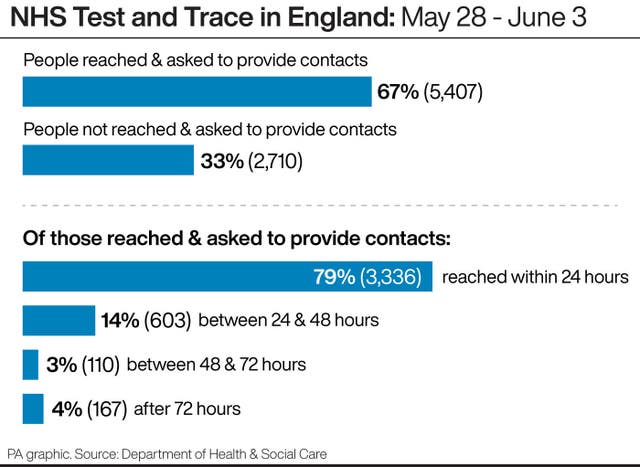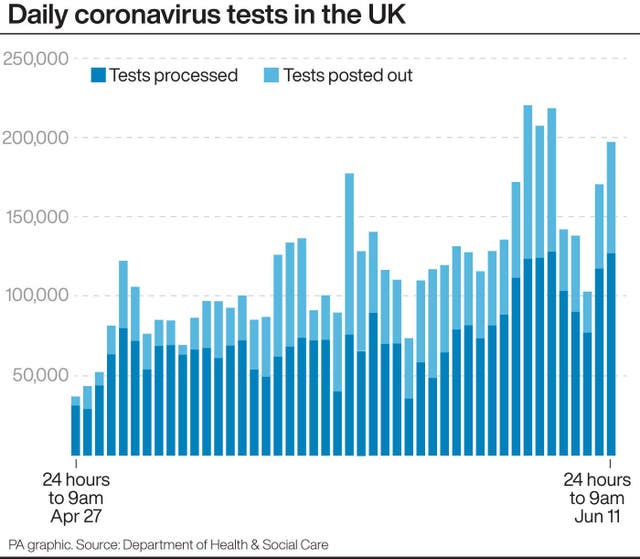The NHS Test and Trace programme is not yet “gold standard”, its head admitted as figures showed a third of people who tested positive for coronavirus could not be reached by officials or failed to provide details of their contacts.
Some 8,117 people who tested positive for Covid-19 in England had their case transferred to the NHS system, of whom 5,407 (67%) were reached, while 2,710 (33%) did not provide information about their contacts or could not be reached.
Overall, 31,794 contacts were identified and, of these, 26,985 were reached and advised to self-isolate – 85% of the total number of contacts.
Of the remaining 15% (4,809), some were not reached, others said they were already taking action independently of the system and some simply refused to comply. People are contacted 10 times in a 24-hour period.
Baroness Dido Harding, the head of the programme, admitted improvements were needed but said the system was “fit for purpose” and most contacts complied with the instructions.
She said even if people could not be contacted, the message was for them to self-isolate if they had symptoms.
“We are not at the gold standard yet that we want to be, of isolating all contacts within 48 hours of someone requesting a test,” Lady Harding said.
“But you can absolutely see the path of how we are going to get there.”
She said the system had been “stood up in extraordinary time” and would get better through the summer.
“Is it completely perfect? No, of course it isn’t. Is there stuff that we all need to do better? Yes there is.”

Baroness Harding said the “vast majority” of people wanted to play their part in the test and trace system.
But she was unable to say how many people contacted and told to self-isolate had refused to comply with the request.
“This is not a mandatory process,” she told reporters.
“I am a really firm believer in the good spirit and civic behaviour of the public and we have seen the public be extremely responsive and supportive.
“These are very good numbers for compliance and we want to encourage people to be part of the system rather than have them be fearful about what might happen to them as they go through it.”
Baroness Harding was unable to give a date for the launch of the delayed app but said it “is the cherry on the cake, it’s not the cake itself”.
The figures on test and trace, from the Department of Health and Social Care, cover the period May 28 to June 3.
The number of Covid-19 positive people reached includes those who provided details about recent contacts or whose cases have been investigated as part of an outbreak.

The number that were not reached includes those where contact details were unavailable or incorrect, or where there has been no response to text, email and call reminders.
It also includes people who the service has been able to contact but who have not provided information about contacts.
This also includes people whose cases are currently being managed as part of active outbreak investigations.
Of those people who were reached and asked to provide information about their contacts, just over three-quarters (79%) were contacted within 24 hours of their case being transferred to the test and trace system.
Some 14% were contacted between 24 and 48 hours, 3% between 48 and 72 hours, and 4% were contacted after 72 hours.
Health Secretary Matt Hancock told the daily Downing Street briefing it was people’s “civic duty” to comply with the scheme.
He added: “I think that the system has worked well and to get two-thirds in the first week of operation, it beat my expectations.
“Then to have the vast majority – 85% – of the contacts that were given self-isolating, that beat my expectations too.”
He said the system would continue to improve and he was “confident it will be world class”.
He added: “Testing for the virus and tracing how it spreads is critical for containing it locally, so that we can ease the national lockdown.
“It’s by isolating the virus that we can control it and we can stop it spreading through our communities.”
Mr Hancock said the Government had not ruled out the introduction of an enforcement mechanism if people failed to comply with the test and trace system.
“We’re not ruling it out at the moment but we don’t think we need it,” he said.
Professor Keith Neal, from the University of Nottingham, said reaching 85% of contacts was a “good result, but we don’t know how many will self-isolate for two weeks”.
He added: “Being unable to contact 33% of diagnosed cases is a concern particularly as a mobile number is involved in requesting the test.
“Some of these are part of other investigations including those related to care facilities – this data should be obtainable and identifiable.
“An absolutely crucial part of the test and trace system is the public committing to it – the system can not work without the public’s involvement.”
In other developments.
– The temporary Nightingale hospitals will remain on standby “for the months ahead” amid fears of a renewed coronavirus outbreak over winter, Downing Street said.
– The majority of children with conditions such as asthma, diabetes, epilepsy and kidney disease do not need to continue to shield and could go back to school, according to new guidance from the Royal College of Paediatrics and Child Health.
– A&E attendances at hospitals in England were down 42% last month compared with a year ago, apparently showing that people have continued to stay away from casualty wards because of the coronavirus outbreak.
– A total of 79,573 urgent cancer referrals were made by GPs in England in April 2020, down from 199,217 in April 2019 – a fall of 60%.




Comments: Our rules
We want our comments to be a lively and valuable part of our community - a place where readers can debate and engage with the most important local issues. The ability to comment on our stories is a privilege, not a right, however, and that privilege may be withdrawn if it is abused or misused.
Please report any comments that break our rules.
Read the rules hereLast Updated:
Report this comment Cancel